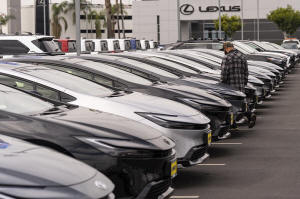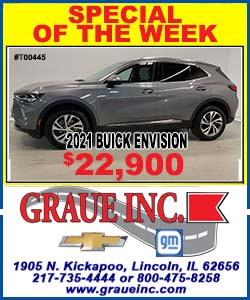From repairs to insurance, Trump's auto tariffs could make owning a car
more expensive
[March 29, 2025] By
WYATTE GRANTHAM-PHILIPS
NEW YORK (AP) — Even if you're not in the market for a new car, U.S.
President Donald Trump's 25% tariffs on auto imports could make owning
one more expensive.
The new taxes, which are set to begin April 3 and expand in the
following weeks, are estimated to raise the average cost of a car
imported from another country by thousands of dollars. But repairs for
vehicles that currently use foreign-made parts are also expected to get
pricier — and, as a result, hike insurance costs farther down the road.
While the White House says these tariffs will foster domestic
manufacturing and raise $100 billion in revenue annually, economists
stress that straining the auto industry's global supply chain brings
significant disruptions. Dealerships and car repair shops will likely
have little choice but to raise prices — leading drivers across the
country to pay more for everyday maintenance.
Here's what you need to know.
How will tariffs affect my next car repair?
It depends on what you need fixed and where you go in to get your car
serviced. But some industry analysts warn that drivers could see costs
jump as early as the coming weeks or months.
“If you are bringing your car to get repaired, chances are, it’s going
to have a part that comes from another country,” said Jessica Caldwell,
head of insights at auto-buying resource Edmunds. “That price that you
pay is likely going to be directly affected by the increase (from these
tariffs).”
Trump’s Wednesday proclamation on auto tariffs points specifically to
engines, transmissions, powertrain parts and electrical components. That
covers a lot of repairs as is, Caldwell notes, and the administration
has also signaled the possibility of future expansion.

And while automakers may develop new pricing strategies for new vehicles
impacted by tariffs, Caldwell expects they will to be less likely to
absorb the costs of individual parts — leaving consumers with the bill
perhaps more imminently.
Much of the car repair market has heavily relied on imports,
particularly from America's biggest trading partners. According to
February numbers from the American Property Casualty Insurance
Association, a trade group that represents home, auto and business
insurers, about 6 in every 10 auto replacement parts used in U.S. auto
shop repairs are imported from Mexico, Canada and China.
“You can’t walk into a dealership today and not see a United Nations of
parts,” said Skyler Chadwick, director of Product Consulting at Cox
Automotive. But sourcing and supply varies between each servicer, he
adds, making it all the more complex to nail down when exactly prices
will rise after these tariffs take effect.
Desiree Hill, owner of Crown’s Corner, an auto repair and mechanics shop
in Conyers, Georgia, says the auto tariffs were already hurting her
business. She was working on repairing a vintage 1960 Opel Rekord car
and ordered a part from Germany, but the manufacturer canceled the order
due to the tariffs.
“I can’t get (the part) anywhere in our country. Period. So that that
was very disappointing,” she said.
About half of the cars she works on are foreign-made, so the tariffs
will make repairing those cars more difficult.
“Unfortunately we don’t have a choice but to raise prices if they are
raised on us,” she said. “We can’t take that kind of loss.”
Car repair prices have already been on the rise for years, with analysts
pointing both to growing labor costs and more expensive components
needed for vehicles with advanced technology.
Edward Salamy, executive director of the Automotive Body Parts
Association, also says car companies have been trying to “gain a
monopoly” to limit remedies to their own parts or processes, reducing
options for consumers.
Tariffs, he said, will just exacerbate the issue: “Many of these
distributors will have no choice but to raise their list price."
How are car dealerships managing?
Joshua Allrich, who operates a family-owned used car dealership called
Allrich Auto in Atlanta, is among those concerned about facing higher
costs while also trying to save his customers money.
[to top of second column] |

A person looks at a new vehicle at a Toyota dealership in El Monte,
Calif., Thursday, March 27, 2025. (AP Photo/Jae C. Hong)
 “It’s going to make things a lot
more expensive," Allirch said, adding that, while he's looking
forward to the possibility of people rushing to buy cars before the
tariffs take effect, his business will soon have to adjust. “My
wheelhouse is economy cars, affordable cars. And now, this tariff is
going to directly hit us because it’s gonna just make things go up.”
Chadwick says that dealers and other servicers will need to be as
transparent as possible as these tariffs take effect while also
preparing to have difficult conversations about rising prices with
customers.
He adds that tariffs are also going to put pressures on the
reselling market. Used cars often have to be serviced before
dealerships can sell them back to customers — again opening the door
for higher repair costs due to tariffs. And “all that cost goes
right back into the consumer" through what they end up having to pay
for the vehicle, he explains.
In efforts to delay impacts, some dealers and repair shops might
turn to stocking up on inventory before tariffs hit, particularly
for parts that get requested the most. Analysts say many have
long-anticipated the threat of auto tariffs, and are already
grappling with the impact of Trump's new steel and aluminum levies
that took effect earlier this month.
But stockpiling can only go so far. And for small business owners,
spending money for a lot of inventory at once can be risky,
especially when Trump's on-again, off-again tariff threats raise
questions about how long they will last.
If they end up being short-lived, Caldwell said, “Do you really want
to buy a bunch of inventory that you’re going to have to sit and
hold on (to) for quite some time?”
What will happen to my insurance premiums?
Because accidents involving new parts will see increased costs for
repairs, insurance premiums will also likely rise due to tariffs.
But that may be farther into the future. Bob Passmore, department
vice president of personal lines at the American Property Casualty
Insurance Association, expects consumers to see an impact on their
insurance bill in 12 to 18 months at a minimum. That's because
increased prices have to hit claims costs, then be implemented after
new rates are filed and approved.
Still, the trade association has estimated that personal auto
insurance claims costs alone could rise a total of between $7
billion and $24 billion annually.
It wasn't immediately clear how large providers of auto insurance
were preparing for the impacts of these tariffs. Allstate, State
Farm, Geico and Progressive did not immediately respond to The
Associated Press' requests for comment on Friday.
But even if it takes long to trickle down, these tariff-related
hikes would again arrive as consumers have already faced rising
insurance costs. The Insurance Information Institute estimated
average U.S. auto premiums increased 14% in 2023 and 12% in 2024.
Mark Friedlander, the institute's senior director of media
relations, said via email that the research trade nonprofit
projected a 7% average premium increase for auto insurance across
the U.S. in 2025 at the start of the year — but that didn't account
for potential tariff impacts, which will drive them even higher.

Increased costs spanning from tariffs cause a “chain reaction for
insurance,” Caldwell adds. “This is a total ownership cost increase,
rather than just a purchase increase."
______
AP Business Writer Mae Anderson in New York and Video Journalist
Sharon Johnson in Atlanta contributed to this report.
All contents © copyright 2025 Associated Press. All rights reserved |